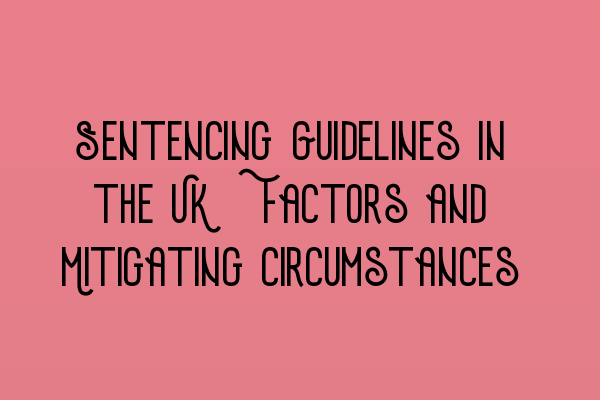Sentencing Guidelines in the UK: Factors and Mitigating Circumstances
As a leading solicitor at SQE Criminal Law & Practice Law UK, I am often asked about the factors and mitigating circumstances that play a crucial role in the sentencing guidelines in the United Kingdom. Understanding these guidelines is important for both legal professionals and individuals facing criminal charges. In this blog post, I will provide an in-depth analysis of the various factors considered by the courts in the UK when determining sentences, as well as the role of mitigating circumstances in the process.
Factors considered in the Sentencing Guidelines
When determining an appropriate sentence, the courts in the UK consider a wide range of factors. These factors include the severity of the offense, the harm caused to the victim or society, the culpability of the offender, the presence of any aggravating or mitigating factors, and the need for punishment and rehabilitation. Let’s dive into each of these factors in more detail.
Severity of the Offense
The severity of the offense is a crucial factor in sentencing. Offenses are classified into different categories, ranging from minor to the most serious. The courts consider the nature of the offense, the level of harm caused, and any significant aggravating or mitigating factors associated with the offense.
Harm to the Victim or Society
Another important consideration is the harm caused to the victim or society as a result of the offense. The courts assess the extent of physical, emotional, and financial harm inflicted on the victim or society at large. The more significant the harm, the higher the potential sentence.
Culpability of the Offender
The culpability or blameworthiness of the offender is also taken into account during the sentencing process. The courts consider the level of intent, planning, and premeditation involved in the offense. A higher degree of culpability leads to more severe sentences.
Aggravating and Mitigating Factors
Aggravating factors are circumstances that increase the seriousness of the offense, such as the use of violence, prior convictions, or exploitation of vulnerable individuals. On the other hand, mitigating factors are circumstances that may reduce the offender’s culpability, such as cooperation with the authorities, genuine remorse, or a history of good character. It is important for legal representation to present these factors effectively during the sentencing hearing to potentially achieve a more favorable outcome. Legal Representation for Delaware LLCs in the UK: Expert Advice
Punishment and Rehabilitation
In addition to considering the factors mentioned above, the courts also take into account the need for punishment and rehabilitation. The aim of sentencing is not only to punish the offender but also to prevent future offenses by facilitating the offender’s rehabilitation and reintegration into society.
Mitigating Circumstances in Sentencing Guidelines
Mitigating circumstances are factors that may reduce the severity of the sentence imposed on an offender. These circumstances can include, but are not limited to, the offender’s age, mental health, lack of previous convictions, expression of remorse, cooperation with the authorities, and personal circumstances that may have influenced the commission of the offense. It is crucial for legal representatives to identify and present these mitigating circumstances effectively to potentially secure a more lenient sentence for their clients. Ensuring Ethical Business Practices: Delaware’s Code of Conduct
It is important to note that while mitigating circumstances can influence the sentencing decision, they do not guarantee a reduced sentence. The courts weigh these factors against the gravity of the offense and the harm caused. Nonetheless, presenting strong arguments regarding mitigating circumstances can greatly impact the final sentence.
Conclusion
Understanding the factors and mitigating circumstances considered in the sentencing guidelines in the UK is crucial for legal professionals and defendants alike. It is essential to engage the services of an experienced solicitor who can effectively present these factors and mitigating circumstances to potentially achieve the best possible outcome.
If you require legal representation in the UK, especially in matters related to criminal law, do not hesitate to reach out to SQE Criminal Law & Practice Law UK. Our team of expert solicitors has extensive experience in handling a diverse range of criminal cases. Legal Challenges for UK Businesses in the U.S.: Strategies for Overcoming Hurdles
For further information about UK Criminal Law, please read our related article: UK Criminal Law: An In-Depth Analysis of the British Legal System. Legal Challenges for UK Businesses in the U.S.: Strategies for Overcoming Hurdles
At SQE Criminal Law & Practice Law UK, we are committed to providing the highest standard of legal representation and advice. Your case will be handled with utmost professionalism and expertise. Contact us today for a confidential consultation. Legal Representation for Delaware LLCs in the UK: Expert Advice
